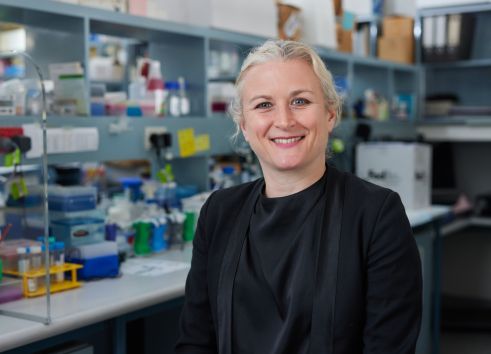Telomere Length Regulation
We focus on understanding the molecular mechanisms underlying telomere length regulation and how telomere length can be manipulated to control cell division.
Telomeres are repetitive sequences of DNA bound to a complex of telomere-specific proteins that function to cap the ends of linear chromosomes, thus maintaining chromosome stability. Telomeric DNA is gradually eroded with each round of cell division, limiting the number of times a normal cell can divide. Telomere maintenance is vital for the continued growth of tumour cells and occurs either by activation of the enzyme telomerase, or by recombination-mediated telomere replication referred to as alternative lengthening of telomeres (ALT).

Professor Hilda Pickett is Head of the Telomere Length Regulation Unit at CMRI. Potential PhD applicants should contact Prof Pickett for specific project details.

BBiotech (Hons), PhD , Postdoctoral Fellow

BMedSci (Hons), PhD, Postdoctoral Fellow
Telomeres are nucleoprotein structures at the ends of linear chromosomes that contribute to the maintenance of chromosome integrity. Telomere length regulation involves an intricate balance between lengthening and shortening processes, which ultimately determines the proliferative capacity of a cell. Telomere length dysregulation can result in cancer, or in an emerging spectrum of premature ageing disorders. The Pickett lab is investigating the mechanism of telomere rapid deletion by telomere trimming, how telomere length contributes to cell proliferation and human health, and how telomere maintenance mechanisms become activated in cancer cells. The Pickett lab is also using next generation sequencing technologies to study telomere length and telomere sequence content. This research will underpin further clinical studies, and will impact upon cancer control and the treatment of short telomere syndromes.
Telomere rapid deletion by telomere trimming involves homologous recombination-mediated resolution of the terminal t-loop, and functions to prevent the persistence of over-lengthened telomeres. Telomere trimming does not elicit a DNA damage response, indicating that the mechanism is a normal well-regulated cellular process. We have identified telomere trimming in normal human cells of germline and somatic origin and in mouse somatic tissues, and are currently investigating telomere trimming in other proliferating cells. In addition, we are characterising the functional proteins and cell signalling responses that regulate telomere trimming.
Short telomeres are associated with adverse health outcomes, including increased risk of multiple diseases such as cardiovascular disease and cancer. Telomeres can be extended by two known mechanisms: the enzyme telomerase, which uses an intrinsic RNA template sequence to reverse transcribe telomeric repeats onto the chromosome end, and the Alternative Lengthening of Telomeres (ALT) pathway, a recombination-dependent replication mechanism that utilises a variety of DNA repair pathways to extend chromosome ends. Telomerase is active in the human germline, early in embryogenesis and in some stem and progenitor cell populations to enable increased proliferative capacity. Cancer cells activate either telomerase or ALT to repair eroded or dysfunctional telomeres to ensure proliferative immortality. The Pickett lab is investigating telomerase activation, as well as the processes that regulate telomerase biogenesis and recruitment. The Pickett lab also works extensively on characterising the mechanism of ALT-mediated telomere lengthening in cancer cells.
Telomeres are thought to comprise almost exclusively hexameric TTAGGG repeats. The Pickett lab have been using whole genome sequencing to demonstrate that telomeres also contain abundant variant telomeric repeats, which contribute to telomere biology. We are currently employing next generation sequencing techniques to accurately measure telomere sequence content, and using this information to characterise telomere length and telomere maintenance mechanisms in large-scale whole genome sequencing datasets.
Christopher Nelson (Senior Research Officer) 2017 - 2025
Robert Lu (PhD Student) 2017 - 2023
Anton Hsu (PhD Student) 2020 - 2024
Robyn Yeh (Research Assistant) 2022 - 2023
Tahlia Lawler (PhD Student) 2021 - 2023
Ekaagra Kesarwani (Honours Student) 2023
Sebastian Crocker (Honours Student) 2021
Vivan Kahl (Research Officer) 2018-2021
Lisa Malloy (Honours Student) 2020
Maurice Chow (Honours Student) 2020
Fiona Yang (PhD Student) 2015-2020
Joshua Allen (Research Assistant) 2012-2020
Michael Lee (Research Assistant and PhD Student) 2013-2019
Advaitha Jagadeesan (Honours Student) 2019
Christopher Tomlinson (Posdoctoral Fellow) 2015-2017
Monica Brygula (PhD Student) 2012-2016
Anagha Killedar (Research Assistant) 2013-2015
Nunki Hassan (Honours Student) 2014
Dimitri Conomos (PhD Student) 2010-2014
Michael Stutz (Research Assistant) 2011-2013
Jadon Wells (Research Assistant)
View key publications
View all publications
Identified a novel telomere length control mechanism termed “telomere trimming”, in which homologous recombination-mediated rapid telomere deletion prevents the persistence of overlengthened telomeres.
Characterised regulated telomere trimming in normal human cells of both germline and somatic origin, demonstrating that telomere trimming is a third mechanism of telomere length control.
Demonstrated variant repeat interspersion throughout ALT telomeres as the result of homologous recombination-mediated telomere replication. This results in diminished shelterin binding, sequence-specific nuclear receptor binding, and an altered nucleoprotein structure.
Characterised multiple independent single nucleotide polymorphisms in the TERT locus that associate with breast and ovarian cancer. This study provides definitive evidence for genetic control of telomere length by common genetic variants.
Defined telomere variant repeat content and telomere maintenance mechanism-specific variant repeat generation in human cells. This study demonstrates a conserved role for variant sequences at human telomeres.
Identified recruitment of the NuRD-ZNF827 chromatin remodelling complex specifically to telomeres in cells that use ALT. This study demonstrates a critically important multifaceted role for NuRD-ZNF827 at ALT telomeres.
Defined the functions of the BTR dissolvase and SLX4 resolvase in break-induced replication-mediated extension at ALT telomeres. This study demonstrates that SLX4 acts to repress telomere elongation whilst BLM acts to promote extension.
Demonstrated that telomere sequence content can be used to determine ALT activity in tumours. This is based on the observation that ALT telomeres have significant sequence variability from the canonical TTAGGG repeat.
Identified a key suppressor of replication stress at ALT telomeres. This study demonstrates that FANCM functions to restrain excessive ALT activity by ameliorating replication stress at telomeres, thereby preventing break-induced telomere synthesis.